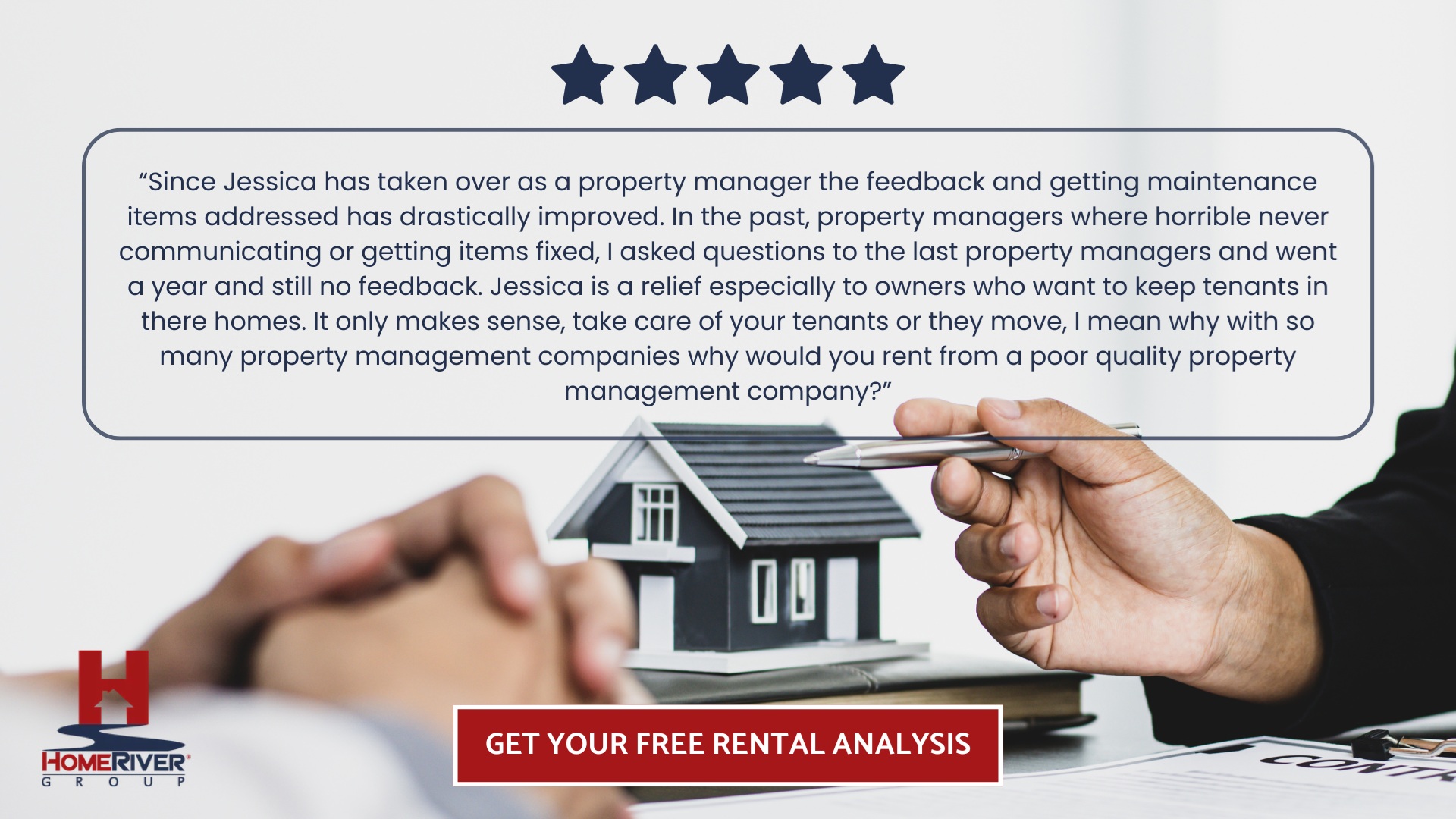
At HomeRiver Group, we have earned our place as a trusted leader in property management by delivering measurable success to property owners nationwide. With a presence in over 32 states, we blend advanced technology, local market knowledge, and a commitment to service excellence. From lowering vacancy rates to improving tenant retention and safeguarding asset value, HomeRiver Group empowers owners to achieve consistent growth while simplifying the complexities of real estate management.
If you’ve ever wondered what happens if you break a lease, the answer depends on your lease terms, state laws, and landlord policies. Ending a lease before the agreed date can trigger financial penalties, loss of your security deposit, or even legal consequences. However, circumstances such as unsafe living conditions or landlord breaches may provide legal grounds for early termination without penalty. Understanding your rights, obligations, and potential costs before taking action ensures you make an informed decision.
In this blog, we will explore the common consequences of breaking a lease early, the legal exceptions that may allow you to exit without penalty, and practical steps you can take to protect your finances, credit history, and future rental prospects.
Understanding Your Lease’s Early Termination Clause
Reviewing your lease’s early termination clause is the first step to understanding what happens if you break a lease.
Clarifying The Purpose Of The Early Termination Clause
Most modern leases include detailed language outlining the process and penalties for ending a lease before its expiration date. This section sets the legal framework for every action that follows, ensuring both parties understand their rights and obligations.
Identifying Conditions That Allow Early Termination
Typically, a lease will specify whether you can terminate early and under what circumstances. These clauses may require you to provide written notice to your landlord or property manager, usually 30 or 60 days in advance. Some leases also include an early termination fee, often equivalent to one or two months’ rent, to offset the costs of finding a new tenant. Sometimes, you might remain responsible for rent payments until a replacement tenant is secured.
Recognizing Exceptions To Standard Lease Obligations
Early termination clauses can also outline exceptions, such as job relocation, military deployment under the Servicemembers Civil Relief Act, or situations involving health and safety concerns. Knowing these exceptions can help determine whether you qualify for a penalty-free exit from your lease.
Understanding Legal Requirements In Your Jurisdiction
Legal requirements and tenant rights vary by state and municipality, so it's essential to know what your lease states and what local laws permit. Keep a copy of your lease for reference, and clarify any ambiguous terms with your property manager or a legal professional to avoid costly misunderstandings.
Legally Acceptable Reasons To Break A Lease
Understanding your legal protections is critical if you're considering early lease termination. Not every situation qualifies as acceptable grounds, but there are specific scenarios where you can break your lease without facing severe penalties.
Here are the most common legally recognized reasons:
Habitability Issues
Landlords are responsible for providing a safe and livable environment. If the property fails to meet health or safety standards, think of major plumbing problems, persistent mold, lack of heating, or structural damage, and you could have grounds to break the lease. Always document issues and allow your landlord to fix them as local law requires.
Active Military Duty
If you are called to active duty, the Servicemembers Civil Relief Act (SCRA) offers federal protection. You can typically terminate your lease 30 days after your next rent payment is due by providing written notice and a copy of your orders.
Domestic Violence Situations
Most states allow victims of domestic violence to break a lease early without financial penalty. You may need to provide specific documentation, such as a restraining order or police report, and adhere to state-mandated notification procedures.
Landlord Harassment Or Privacy Violations
If your landlord repeatedly enters the property without notice, changes the locks, or invades your privacy, you may have a lawful reason to move out. Persistent harassment or neglect of privacy rights often violates your lease agreement or even state law.
Unenforceable Lease Clauses
You may have the right to terminate the agreement if your lease contains illegal or unenforceable terms. Common examples include discriminatory provisions or waiving your fundamental tenant rights.
Always review your local and state regulations for specific nuances in the law. If you’re unsure, consulting with a legal professional can help you fully understand what happens if you break a lease and whether your circumstances meet the necessary standards.
How Early Termination Affects Your Credit and Rental History
Terminating a lease before its agreed-upon end date can have significant consequences beyond immediate financial penalties.
Potential Credit Score Impact
If any related debts, such as unpaid rent, fees, or penalties, remain unresolved, your landlord may report them to credit bureaus. This could cause your credit score to drop; the negative mark can stay on your record for up to seven years. A lowered score can make it more challenging to obtain loans, secure credit cards, or access favorable interest rates in the future.
Effects On Your Rental History
Beyond credit, breaking a lease can leave a mark on your rental history. Many landlords use tenant screening services that record prior lease terminations, eviction filings, or disputes. Even if you believe you followed the terms, a landlord’s report may influence how future property managers view your application. This can make finding new housing more difficult, especially in competitive rental markets.
Proactive Steps To Minimize Damage
Timely payment of outstanding balances and transparent communication with your landlord can sometimes prevent these consequences. Negotiating a mutual termination agreement or helping to find a replacement tenant may also keep your credit and rental history intact. Always review your lease’s terms and take action early to address potential problems before they escalate.
Recovering Your Security Deposit After Early Exit
Most agreements permit landlords to deduct specific costs from your security deposit when ending a lease early. These may include unpaid rent, repair expenses for damage beyond normal wear and tear, and certain contractual fees. Reviewing your lease before moving out helps you anticipate these deductions and address any preventable issues ahead of time.
Documenting Property Condition Before Move-Out: Thorough documentation is your strongest defense against unfair deductions. Take clear, timestamped photographs of every room, fixture, and appliance, and note their condition in writing. Compare this to your move-in documentation to establish a clear record of changes during your tenancy.
Maintaining Clear & Written Communication: Notify your landlord in writing of your intended move-out date, and keep a copy of all correspondence. Return all keys, remotes, and access devices promptly. Request a joint walk-through inspection to address any issues immediately, reducing the chance of disputes later.
Following State-Mandated Deposit Return Timelines: Each state sets its deadline for returning security deposits, usually between 14 and 30 days after you vacate. Landlords must provide an itemized statement of deductions within this period. If you receive deductions you believe are unfair, respond promptly with supporting evidence to dispute the charges.
Taking Steps To Maximize Your Refund: By proactively repairing minor issues, meeting all lease obligations, and keeping meticulous records, you increase the likelihood of receiving your deposit in full. Organization and persistence can help protect your funds even when leaving a lease early.
State-Specific Landlord-Tenant Regulations To Know
Every state has landlord-tenant laws dictating the process and consequences of breaking a lease. These rules set the framework for rights and responsibilities, which can determine whether tenants face penalties or have valid grounds for early exit without financial loss.
Good Faith Effort To Re-Rent Requirements
Some states require landlords to actively seek new tenants when a lease is broken. For example, California law obligates landlords to re-rent promptly, limiting the tenant’s rent liability to the period before a new renter moves in.
States With Less Stringent Re-Renting Obligations
In states like Texas, landlords are not under the same obligation to find a replacement tenant quickly. This can leave tenants liable for more rent after moving out early, making it crucial to understand local laws before making decisions.
Variation In Lease Break Fees And Notice Periods
Rules about required notice and associated fees differ widely. In New York, tenants may need to provide notice anywhere from 30 to 90 days, depending on the lease and local ordinances. These requirements directly affect timelines and potential costs.
Exceptions For Specific Circumstances
Many states provide legal exceptions that allow tenants to end a lease without penalty, such as for military service under the Servicemembers Civil Relief Act, domestic violence situations, or uninhabitable living conditions.
Reviewing Local Statutes For Compliance
Before breaking a lease, review your state’s landlord-tenant laws or consult a housing authority. Understanding your legal position helps protect your finances, avoid disputes, and ensure all steps follow the law.
Final Thoughts
Breaking a lease is a significant decision that can result in financial and legal consequences. As your trusted partner in property management, HomeRiver Group understands that life circumstances change, and sometimes, ending a lease early is unavoidable. As a renter or buyer, you must be clear about what happens if you break a lease, including possible penalties, the importance of proper notice, and any negotiation opportunities that might exist with your landlord or property manager.
Consider reviewing your lease agreement closely before taking any action. Open communication with your property manager is key; many situations can be resolved more amicably when both parties understand each other’s needs.
At HomeRiver Group, we are dedicated to providing exceptional service with local expertise. Our team supports you through every phase of your rental experience, including understanding your rights and obligations when circumstances require a change.
Read also:
Can A Landlord Break A Lease? Know Your Rights And Responsibilities
How Much Does Rent Increase Per Year? What Landlords Should Expect
What Landlords Cannot Do In Tennessee: Legal Restrictions Explained
Frequently Asked Questions About What Happens If You Break A Lease
What does it mean to break a lease early?
Breaking a lease early means ending your rental agreement before the end date specified in your contract. This usually requires notifying your landlord or property manager and following the procedures in your lease agreement.
What are common reasons tenants break a lease early?
Common reasons include job relocation, family emergencies, military deployment, changes in financial circumstances, or issues with the rental unit that affect habitability. Each situation is unique, and your lease may specify acceptable grounds for early termination.
Are there any penalties for breaking a lease?
Penalties for breaking a lease vary based on the lease terms and local laws. You may be responsible for paying the remaining rent, forfeiting your security deposit, or covering the cost of re-renting the unit. Reviewing your lease and talking to your property manager will clarify the consequences.
Will breaking a lease hurt my credit score?
Breaking a lease does not automatically affect your credit. However, if you owe unpaid rent or fees and do not resolve them, your landlord may report the debt to credit agencies or take legal action, impacting your credit score.
How can I minimize the financial impact of breaking a lease?
Open communication is essential. If allowed, notify your property manager immediately, provide proper notice, and help find a replacement tenant. Carefully reading your lease agreement and understanding your responsibilities can also reduce costs.
Is it possible to break a lease without penalty?
Some leases outline specific circumstances, such as military deployment or uninhabitable living conditions, that allow for early termination without penalty. State and local laws may provide additional protections. Always review your agreement or consult with your property manager for guidance.
What is a lease termination notice?
A lease termination notice is a formal written notification sent to your landlord or property management company stating your intention to end your lease early. This notice usually requires specific information and must be submitted within the timeframe defined in your lease.











